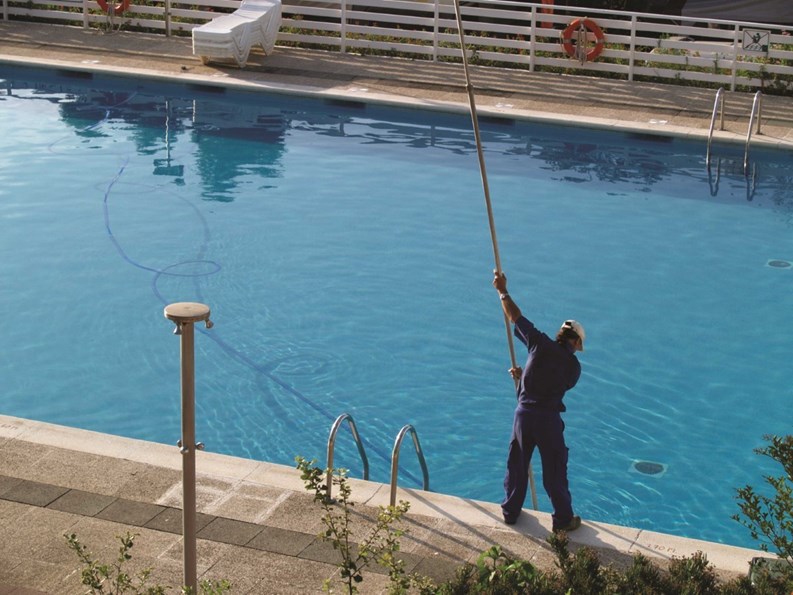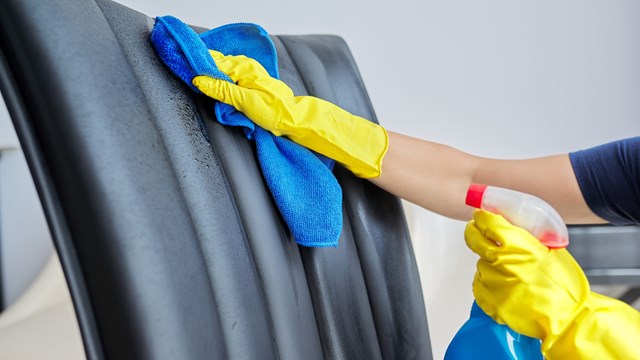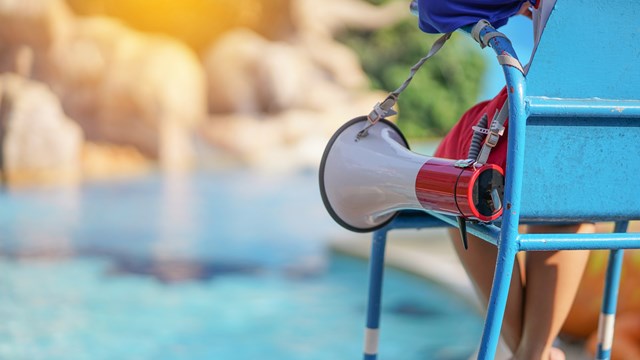In addition to all the benefits of being part of a homeowners association, an HOA’s recreational amenities attract residents to a particular community as well. But while major amenities like community swimming pools have their advantages, they also must be properly monitored and maintained in order to stay safe and functional.
Managing Your Pool
Maintaining a community pool is no small task. Daily monitoring, maintenance, upkeep and minimizing risk are all part and parcel of having a pool on your grounds. Whether it’s indoor or outdoor, a pool needs year-round attention, and this should be taken into consideration when determining if you will self-manage or hire an outside pool service to handle the day-to-day and season-to-season maintenance schedule.
“I would recommend hiring an outside pool service because they have a large liability umbrella,” says Tom Zarra, maintenance supervisor at Lake Ridge, an adult community in Toms River. Zarra is himself a certified pool operator, but feels that an outside pool service can help mitigate the possible hazards arising from having water, electricity and chemicals in close quarters. “They don’t mix well unless you have constant supervision,” he says.
But even having a professional pool management company on the job doesn’t let managers and HOA support staff off the hook. Managers should be educated about the basics of pool maintenance and operations, at the very least.
“I like to be well educated myself, because I’m ultimately responsible,” says Zarra. “It’s good to know exactly what you’re taking about.”
In addition to hiring a professional pool management company, make sure that the pool’s water is properly treated with the necessary chemicals.
“Monitor and maintain water chemistry within acceptable parameters. And always take care to summerize and winterize your pool properly,” says Russ Lane of Sparkling Pool Services in Hightstown.
The management team must conduct several inspections throughout the year, says Kathleen Nicolas, community manager of Paddington Square at Mahwah, in Mahwah.
“There are inspections before the pool opens, inspections on a daily basis when it’s open, and inspections after the pool closes for the season,” says Nicolas. “You also need to have a good company for lifeguards and management needs to make sure they’re doing their job while the pool is open.”
“As a manager, I should know that they’re doing testing on the water every day to make sure it’s safe,” says Nicolas. “I should also know that none of the equipment is broken; that the tiles and cement around the pool and the bricks are well-maintained and not a trip hazard or liability; that lifeguards are in uniforms so everyone knows who they are.”
Equipment should also be checked on a daily basis and water tested regularly. “Testing for the water is reported to the state,” Nicolas continues. “If it’s not at sufficient [chemical levels], you’ll get a warning and you have to fix it within a certain period of time.”
If your pool is seasonal, you’ll need to start in the spring to prepare it for use in the warm weather.
“For the spring start up, you’re moving in furniture, blowing out the lines, starting up the pool again to treat it and filter it,” says Zarra. “At the end of season, the pool is drained and covered and chemicals are added.”
If you have an indoor pool, as Lake Ridge does, it is likely used year-round, so maintenance is constant. “We do drain it once a year, and power-wash the inside to clean everything out,” says Zarra.
Staffing Your Pool
Your board’s decision of whether to self-manage your pool or bring in outside professionals depends largely on your HOA’s needs, and how involved the association wants to be in regular operations of the pool.
According to Lane, “The advantages to hiring an outside contractor are, just to name a few, that any issues that arise are never your problem—such as when a guard calls out sick, when water chemistry is out of parameter, and so on. Secondly, primary insurance is no longer your responsibility, and third, consultation is only a phone call away. If an association is going to operate a pool themselves, they must be sure to have the proper certification, the proper insurance and the proper knowledge.”
If the pool is really big and heavily used, “a community might want to get two lifeguards during the day and two at night, and they may need the same on the weekends with a badge checker, who makes sure residents live there,” says Nicolas. “The badge checker also must be a certified lifeguard, just in case.”
According to the professionals, all lifeguards must have a license, and they have to be certified. Those certificates have to be given to your community’s management office, which should maintain all records of certifications and permits.
At Lake Ridge, the daily operations of the community’s two pools (one indoors, the other outdoors) are overseen by a pool management company.
“We are self-managed—one of the very few communities that is self-managed,” says Zarra, “but we do have a pool management company for day-to-day operations, and they supply the lifeguards, but we are mandated by the state to perform certain duties.” Zarra says these include taking care of proper signage, maintaining pool clarity, and handling storage and gating requirements.
Monitoring Conditions and Chemicals
If you have an in-house manager, he or she must have certain basic knowledge in order to keep your pool in good shape and to avoid problems down the road.
“A manager who is going to operate a pool facility must—minimally—know how to test and adjust the chemical levels in the pool, perform pump maintenance and troubleshoot both mechanical and chemical issues and problems,” says Lane.
“Commercial swimming pools are required to have automatic chlorinators,” Lane continues. “These chlorinators can be for either liquid or tablet chlorine. Other chemicals required are calcium chloride (to adjust the calcium levels), sodium bicarbonate/sodium bisulfate (to adjust the alkalinity and pH) and sometimes algaecides,” he says.
At Paddington Square, the community’s lifeguards also do double-duty, as they also monitor the pool’s chemicals.
“Our lifeguards are responsible for maintaining the chemicals in the pool, testing the water and making sure everything is backwashed in the filtration system. The lifeguards report the condition of the water to their company, which in turn reports that information to the state,” says Nicolas. “If something’s off, they alert me, and we’ll get someone in to fix it.”
“You have to know a little bit about the chemical makeup and chemicals that you’re using, the safety protocols, how to store them, contamination of pool water and how to handle it properly,” says Zarra. “You should also know about your chemical feed system and automatic chlorinators, your pool and spa and water problems, the filtration system that keeps your water clean, the temperature, the heating and air circulation, the chemical testing which is mandated by the state—and keeping records is very important too.”
According to Lane, chemical levels in either an indoor or outdoor pool must be monitored to ensure that chemical concentration doesn’t get too high and damage the tiles. Typically, a pool is prepared in the spring. Sometimes it is drained and acid-washed, and other times it is only shocked and restarted. The facility is then maintained throughout the summer and then winterized in the fall. The winterization process is done to ensure that there will not be damage during the winter months due to the freezing temperatures and harsh weather.
Although water needs to be checked on a regular basis, new technology has made it easier to monitor.
“One of the best new technologies is the automatic chemical system that both monitors and adjusts the chlorine and pH in the pool automatically,” says Lane. “Small adjustments are constantly made to keep the water in perfect condition. They require very little human interaction with the exception of occasional calibration.”
“There are always new products available, new antiseptics for better ways to sanitize,” agrees Zarra. “But the basic sanitizer is chlorine, and that has stayed the same for many years. If you maintain your proper pH and proper chlorine levels, you’re not going to need a lot of additional chemicals. Be proactive and not reactive so that doesn’t happen.”
In addition to daily upkeep, your staff should be trained to recognize potential problems and damage to the pool and surrounding areas.
According to Lane, “Some signs of neglected pool maintenance are hollow or broken coping, a very rough interior surface and/or cloudy, discolored water. Depending on the severity of the problem, it is always best to call a qualified pool service technician to come correct the problem.”
The Financial Impact
In addition to staffing costs, the cost of operating and maintaining a pool is high, to say the least. Not surprisingly, the water bill is among the larger bills associated with community pools.
“Our water bill for the last quarter of the summer was $16,000,” says Nicolas. “It could run more or less, depending on the size of the pool.” Nicolas adds that the water bill includes the sprinklers in the community, clubhouse and pool.
Repairs and upkeep also factor into the cost of operating a community pool. Everything from maintaining poolside furniture to more costly structural issues will affect your bottom line.
“Prior to opening, you have a state inspection,” Nicolas continues. “If there are any repairs needed prior to opening, you have to get those fixed. You have to maintain your filters and all your equipment. And if your chairs, tables or umbrellas break, you obviously have to replace them.”
Rules and Regulations
All associations—especially those that are self-managed—should stay abreast of any local or state laws in relation to having a pool on-site.
“There is no law requiring a pool to have a winter cover, although many insurance companies require it,” says Lane. “Owners would be wise to check with local authorities. Pool fencing is a very involved section of code. It is best to check local ordinances for specifics.”
“For our outdoor gated pool, we have a six-foot aluminum fence that surrounds the pool with a padlock when it is not in use. At the end of the season we cover the pool,” says Zarra.
The pool and management professionals agree that it’s always better to be safe than sorry. To minimize risk and injury to residents, consider limiting pool hours to when lifeguards are on duty.
“We’ve opted to have lifeguards,” says Zarra. “When there’s no lifeguard on duty, we simply don’t let people in.”
In addition to local and state laws, there are rules and regulations that the association puts into play to control access and limit risks to safety. Lake Ridge has developed its own in-house standard operating procedures, and Paddington Square has association rules as well.
“In general, these rules include no running, no diving, no food around the pool area and no glass bottles,” says Nicolas. “In my community we have an upper level [surrounding the pool area] and residents can go upstairs to eat. All residents must be registered with the association and have proper badges to show that they live there. You don’t want anyone just walking in.”
A swimming pool is an asset to your community and its residents, and an amenity that everyone should be able to enjoy. A knowledgeable staff and a proactive approach to maintenance and upkeep can be the best defense against potential problems, and will keep your pool in good shape for many years to come.
Stephanie Mannino is a freelance writer and a frequent contributor to The New Jersey Cooperator.







Comments
Leave a Comment